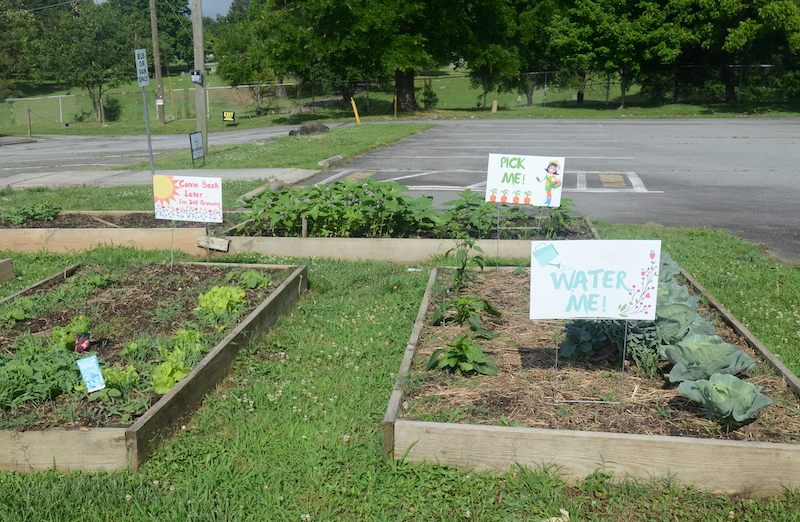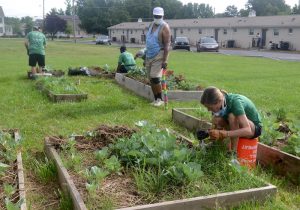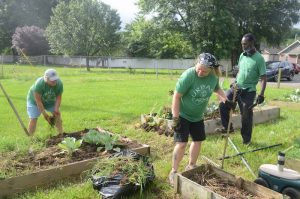Posted on June 26, 2020

By Dan Bayer
Collaboration is often the key to creating resiliency in a community. With few resources, collaboration can allow organizations to “double up,” avoiding redundancy of services, fostering a creative back-and-forth and allowing the transfer of institutional knowledge from one organization to another. In such a collaboration, the Guilford Urban Farming Initiative (GUFI), the recipient of a “Cultivate Resilient Communities” grant from the NCA Center for Communication, Community Collaboration and Change (CCCC) at UNCG, has been working with the New Hope Community Development Group (NHCDG) on maintaining and developing community farms in east Greensboro.
Community resilience is the collective ability of a geographically bound community to deal with adversity and recover from it (Chandra et al., 2011). “Most community resilience research has been done in the context of disasters, but we can say that many communities face adversity on a regular basis, whether it is economic, social, public health, or a combination of them, making resilience a perpetual challenge,” says Dr. Etsuko Kinefuchi, a professor in the Communication Studies Department at UNCG who is collaborating with GUFI as part of the CCCC’s resiliency project. “Inter-organizational collaboration provides these elements, making it a crucial piece in any project that aims to help build community resilience. GUFI is one such project that seeks to contribute to community resilience by providing affordable whole food and work development opportunities. This is a major undertaking that relies on partnerships with many different sectors.” Research shows that a number of elements contribute to community resilience including “social connectedness and social capital; information and communication; and the ability to learn, solve problems, take collective action, and transform” (Pfefferbaum, Van Horn, & Pfefferbaum, 2017, p. 105).
“Inter-organizational collaboration provides these elements, making it a crucial piece in any project that aims to help build community resilience. GUFI is one such project that seeks to contribute to community resilience by providing affordable whole food and work development opportunities. This is a major undertaking that relies on partnerships with many different sectors.” Research shows that a number of elements contribute to community resilience including “social connectedness and social capital; information and communication; and the ability to learn, solve problems, take collective action, and transform” (Pfefferbaum, Van Horn, & Pfefferbaum, 2017, p. 105).
“I’ve been working on the gardens since 2016,” says Rev. Walter M. Richmond. It’s a Thursday morning in early June, and Richmond and volunteers from GUFI are out at the community garden at Mt. Olivet A.M.E. Zion Church. It’s cool and overcast, perfect weather for working outside before the heat of the day arrives in force.
Richmond is the co-founder of NHCDG, which started its community work in 2004. Besides community gardens, it also offers services such as computer technology classes, predatory lending seminars, and medical services through the Mustard Seed Community Health Center.
“The gardens started out with just myself, at New Hope Baptist Church on English Street,” says Richmond. “I wanted to provide nutritious food in a community that’s a food desert. We had four or five beer stores in the area, but nowhere to grow vegetables.”
 The community gardens expanded in 2017 with the addition of seven more beds at Eastside Gardens on Gillespie Street. That was also the year that Barry Campbell came aboard with the project, says Richmond.
The community gardens expanded in 2017 with the addition of seven more beds at Eastside Gardens on Gillespie Street. That was also the year that Barry Campbell came aboard with the project, says Richmond.
“Barry and the Rev. Richmond are so awesome,” says Paula Sieber, executive director of GUFI. “Rev. Richmond is also helping with the Bountiful Land Food for All Farmers Market, which will make sure people can buy affordable, healthy food.” GUFI is currently working on its own community garden, using land shared with Tiny Houses Community Development Inc., an organization providing affordable housing to the homeless.
“We’ve got a couple of goals,” says GUFI volunteer Will Pharr of the efforts to increase the supply of healthy food available in Greensboro neighborhoods. “Some people grow too much food. If we have a local network of community farmers, that can be an opportunity to create a way of redistributing food to the people who need it. The other goal is to improve young people’s connection to the Earth by involving them in farming.”
The first Bountiful Land Food for All Farmers Markets will be held Saturday, June 27 in High Point at 701 East Washington Drive and in Greensboro at 1901 McConnell Road from 10am to 2pm and will continue every week thereafter. The Greensboro Market is co-sponsored by the NC NAACP.
Chandra, A., Acosta, J., Stern, S., Uscher-Pines, L., Williams, M. V., Yeung, D., et al. (2011). Building community resilience to disasters: A way forward to enhance national health security. Santa Monica, CA: RAND Corporation
Pfefferbaum, B., Van Horn, R. L., & Pfefferbaum, R. L. (2017). A conceptual framework to enhance community resilience using social capital. Clinical Social Work Journal, 45, 102-110. doi: 10.1007/s10615-015-0556-z